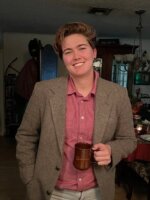The five-block neighborhood just north of downtown was the only dedicated space for Black residents during segregation. The Hill thrived because of Black entrepreneurs and the support system required to survive while physically and racially segregated from the rest of the city. Places of worship like Mount Olive Baptist Church, which still stands today, and night clubs including Lou's Blue Lounge, were cultural anchors.
"Echoes from the Hill" is the largest collaborative effort to tell the neighborhood's story to date. The idea for the project stemmed from the city's Martin Luther King Jr. Celebration Committee, with funding from the Arlington Tomorrow Foundation. Southroad Pictures and Sagassé Media Group produced the series, and producers include employees from the Arlington Public Library, city government and Arlington Historical Society.
The remaining four parts of the documentary will air over the next several years. The documentary also augments documents available the Arlington Black History Community Archive, an ongoing digital collection of photos, recordings and documents.
"Echoes from the Hill" will air throughout the city's second annual Juneteenth Jubilee. The premiere is set for 7 p.m. Friday to an audience at the Arlington ISD Center for Visual and Performing Arts. Tickets are available at echoesfromthehill.com. The first episode will air each hour between 10 a.m. and 2 p.m. Saturday at the City Council Chamber, 101 W. Abram St.
Lisa Thompson, an executive producer and head of the MLK Celebration Committee, and Shirley Adams, an associate producer, spoke with KERA's Kailey Broussard about the docuseries ahead of the premiere. Their conversation has been edited for clarity and brevity.
Project concept and shared experiences
Adams: "It started out that MLK Celebration committee, we've been talking about maybe having something year-round. There was some talk about preserving oral history, and it evolved into this 'Echoes (from) the Hill' project. We got a grant from the Arlington Tomorrow Foundation and as it evolved we went from a virtual setting of celebration (for MLK Jr. Day) in 2021, we had some money that we needed to spend on a project. It turned out that capturing what had happened, the relationship and the internal and external relationship, and what evolved in the Hill was a part, was a significant part of Arlington history."
Thompson: "I moved to Arlington in 1984, and I really didn't, never learned the history of Arlington. I actually thought Arlington was something that was newly created. I didn't realize that there were African Americans that lived here and got this community started back in the late 1800s. I had no idea that there was plantations or any other type of community in which they were allowed to live, the schools that they couldn't attend and the schools that were available for them to attend. Not only does it help me to understand Arlington but it also gives me more thoughts on what was it like where I came from."
Adams: "Lisa's from Kansas, and so she grew up in a different era. I grew up in the segregated South. And so from the history of Black history, a lot of the people that were in the south migrated to the North for opportunities in the late 1800s, 1900s, lived in enclaves in the urban towns as they grew. And so they had a somewhat different experience. But those of us who were raised in the South, and as I sit with the filming, what I realized was it was my story. It's every Black story of a Black person who was raised in the South after reconstruction and the Jim Crow era to the civil rights era, it's common history. And even before that and beyond that, there's a common bond, a common story, a common thread that weaves through everyone's history."
Significance of the Hill's story today
Thompson: "I think for generations to come and not just for generations to come, but for those generations that are current, those individuals who live here. Just like I said, I'm not from this area. But it gives me a sense of pride to know that there are families that lived in this community and the things that they had to undergo to get to where they are, the perseverance, the pride that they carry within themselves to continue to make it. No matter what people thought of you, no matter how they treated you, they survived. You know, they made things happen so that, like you said earlier, so that their offspring will be able to have a better life."
Adams: "And the people that are in the 'Echoes from the Hill,' they're in their 70s and 80s. If we don't get the story done now, they'll be lost. Our children are children of integration. They don't know about living in a Black community. They do not have that experience. Where your teacher was also the musician at the church and you couldn't escape, you know, you lived so there was nothing hidden ... You were under constant watch and supervision. They do not have that sense of that continuity that we had. So if we don't capture it now, the stories, those stories will be lost because we'll be gone on."
Got a tip? Email Kailey Broussard at kbroussard@kera.org. You can follow Kailey on Twitter @KaileyBroussard.
KERA News is made possible through the generosity of our members. If you find this reporting valuable, consider making a tax-deductible gift today. Thank you.





